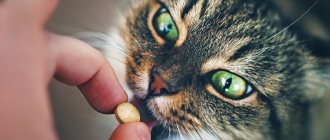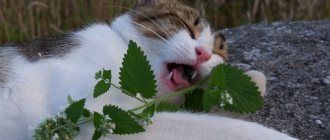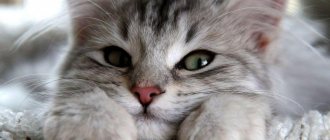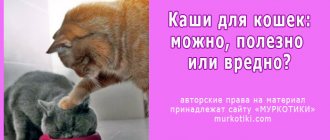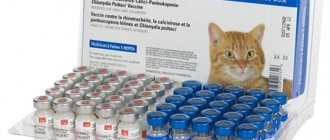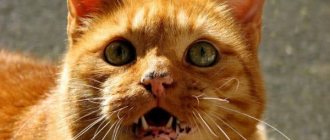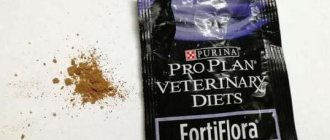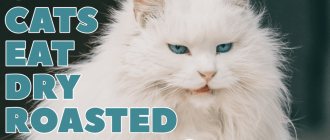Why do cats love valerian so much? A medicine made from valerian root is found in every home medicine cabinet, and people do not consider it necessary to hide this harmless sedative. But as soon as a cat appears next to the odorous composition, the danger increases to gigantic proportions.
These animals adore valerian and do not suspect the risk to their health and psyche.
Why cats love valerian and what happens to them
The specific reaction of animals to substances containing valerian root is known mainly from practical observations. Valerian for cats is an energy drink, a sleeping pill, and a deadly drug in one bottle.
And everything happens in exactly this order:
- after taking valerian, the cat experiences a short period of hyperactivity;
- then the pet becomes lethargic and drowsy;
- and if the cat does not wake up for a long time - sometimes up to 2 days - you need to invite a veterinarian and save the animal.
Valerian as a medicine
However, valerian does not always bring only harm. Sometimes it can be used for medicinal purposes, for example, for :
- Heart failure;
- Spasms in the stomach and intestines;
- Digestive problems;
- Excessive passivity of the cat.
Remember that you cannot prescribe medicine to your cat yourself. The benefits of taking valerian are much less than the harm. Before use (regardless of the diagnosis), consultation with a veterinarian is necessary.
© shutterstock
Why cats love valerian: the general process
Cats love valerian because it contains actinidin (a group of pheromones). Pheromones form behavioral algorithms associated with social and genetic processes. Cats like valerian for a completely natural reason - it works as an amplifier of “friend or foe” signals.
It sounds complicated, but in reality it looks much simpler. It is enough for an animal to sniff a drug containing actinidin, and its brain receives a signal about the close presence of representatives of a related tribe.
Valerian for cats is an impulse to mark territory, take a dominant position on it and show sexual desire.
Does this have a bad effect on the body?
Cats can easily become addicted to the tincture, it is a truly powerful herb for them. Valerian root is infused with alcohol. Representatives of felines cannot resist alcohol, which means that they can quickly become intoxicated.
It is highly recommended to hide valerian from your pet. You shouldn't give it to your cat for fun. Alcohol is harmful to the human body, and it is even more dangerous for animals. Valerian mixed with alcohol can seriously harm your animal, and alcohol in the medicine can cause:
- stomach ulcer;
- kidney disease (renal failure);
- dullness of actions, motor activity;
- liver disease.
A list of such diseases will definitely not bring any good to your pet, be careful with it.
The effect of valerian on cats: the similarity of the smells of feline and actinidin
To understand the mechanics of the process in more detail, you need to remember such a component of cat marks as feline. It is found in the urine of sexually mature individuals and serves as a natural marker. The reason cats love valerian lies precisely in the similarity of two fragrant aromas: feline and actinidin.
Animals simply confuse them.
Well, subsequent excitement is just a natural reaction of the body to the presence of a stranger cat nearby. Instincts and behavioral stereotypes come into play.
The animal mechanically performs a ritual programmed by nature. This is due to the almost identical effect of valerian on cats in all cases.
Valerian acts on cats for a limited period of time. Due to the too high concentration of actinidin, it causes a violent reaction and quickly takes away the animal’s strength, putting it into a state of apathy and drowsiness.
Does valerian calm cats?
Valerian does not act as a sedative or hypnotic on cats, unlike it does on humans. On the contrary, it has a strong stimulating effect on their nervous system. After a half-hour period of hyperactivity, which begins as soon as the animal smells valerian, chews the root or drinks the infusion, apathy sets in. Cats become weak, lethargic and indifferent to everything. They can lie calmly in the arms of their owner or sleep for a very long time, not reacting to noise or touch. Such a dream is not the result of the calming effect of valerian, but only a consequence of the depletion of the cat’s body.
You should not give your cat valerian to calm it down - most likely, the result will be the opposite of what you want.
If it is necessary to calm or euthanize an animal, for example, in order to transfer it somewhere, it is better to use another remedy other than valerian. Medicines for humans and animals are very different, so only special medications can be given to them. Only a veterinarian can say which remedy will help calm the cat without causing harm to it.
The exception when valerian can actually have a calming effect on a cat is during estrus. If the cat constantly meows and calls the cat, she is sometimes given valerian to smell. The smell of the medicine can calm the cat a little, deceiving it that there is a cat somewhere nearby. However, in some cases the effect is exactly the opposite, and the cat begins to behave even more excitedly. In general, if a cat is walking, it will not be possible to wean it off with valerian.
This is interesting
During heat, a cat's hormonal levels change, which affects her behavior. To calm the animal, special herbal infusions are used, which can be purchased at a veterinary pharmacy. Veterinarians do not recommend the use of hormonal drugs, as they are harmful to the health of the animal.
Does it affect everyone the same: the effects of valerian on different cats
All animals react to the drug individually:
- A third of cats do not feel the effects of valerian. For them it is a normal smell, unremarkable and neutral. Even a kitten under the age of six months will not show interest in him - he is still far from reaching sexually mature instincts. Siamese cats will not be impressed by valerian. This breed does not react to actinidin odors.
- Another 30% express an average degree of involvement - short-term activity is replaced by an equally quick rest and return to normal behavior.
- The remaining group is a riotous madness. Valerian should not be given to such cats. The animal will experience severe emotional stress and a long period of rest.
The final group is at risk due to the “valerian hangover” syndrome. As soon as he comes to his senses, the cat will begin to look for the source of the remembered smell.
The active ingredient of valerian has a stronger effect on male cats. The fact is that the feline content in their urine is 4 times higher than in cats.
Composition and mechanism of action
Valerian officinalis root extract includes:
- essential oil – 0.5-2%;
- free valeric acid;
- mono- and sesquiterpenes - borneol, bornyl acetate, valeranone, valerenal, valerinyl acetate;
- alkaloids – actinidine, pyrrolidone;
- esters of organic acids - butyric, acetic, formic (more than 20%);
- tannins;
- resins;
- saponins;
- Sahara;
- glycosides, including valeride;
- valepotriates.
More than 150 chemical compounds have been isolated from the rhizomes of the plant, most of which are bioactive.
Valeric acid, which is part of the extract, interacts with GABAA receptors located in the central nervous system, muscles, motor part of the brain, and cochlea of the inner ear. They bind psychotropic substances (barbiturates), ethanol, and neurosteroids.
Ethyl alcohol, which is part of the tincture, causes very rapid intoxication, intoxication and alcohol dependence in cats. In addition, valeric acid causes muscle relaxation and impaired coordination of movements. The effect is similar to the effect of barbiturates, which cause addiction and drug dependence.
The active components of valerian affect the automatism and conduction system of the heart. In cats, the heart rate increases and blood pressure rises. In humans, the opposite effect occurs. Over time, the indicators drop and the cat becomes lethargic.
Actinidin, which is part of the essential oil of the plant, causes sexual arousal in cats, as its smell is similar to the pheromones released by a cat during estrus. A similar effect is caused by catnip nepetalactone.
The difficulty in establishing the mechanism of action of valerian is that almost all substances have a bioactive effect. Many compounds have a wide spectrum of action and enhance each other's chemistry.
Behavior of cats after taking valerian: symptoms and consequences
Two categories tolerate contact with the drug quite neutrally, and they do not experience discomfort after the cessation of its action. Representatives of the first group simply avoid the intrusive odor, while the second easily tolerate both the active stress phase and the passive exit from it.
Things are worse for animals from the third group. It will not be difficult to give such a cat a drink of valerian. But to return it to normal, you will have to make an effort.
In addition to long sleep, the following will appear:
- symptoms of poisoning;
- lack of coordination of movements;
- apathy, indifference to games and communication;
- lack of interest in food or physical inability to eat it.
Sometimes, due to the use of valerian, aggressive habits develop and the character of the animal changes.
For cats, valerian is a highly dangerous drug. It is risky to offer it to your pet without a good reason and a veterinarian’s prescription.
Can the product be used for medicinal purposes?
Veterinarians do not recommend treating a cat with valerian. Any medicine must be prescribed by a specialist. In some cases, doctors advise giving a few drops of valerian to animals with lack of appetite, depression, and apathy. The medicine will have a stimulating effect, but only if the veterinarian’s instructions are strictly followed.
A safer alternative to valerian is catnip or catnip. Its bioactive substances do not cause addiction or side effects. A few mint leaves will help your cat cope with stress from visiting the veterinary clinic, moving, or performing at an exhibition.
Some people advise training cats to use a scratching post or litter box with the help of valerian. But there are special products that contain the essential oil of the plant. They are safer than tincture.
Dry catnip herb is placed in toys and pillows to improve cat sleep. But the use of plants that are attractive to the cat breed must be coordinated with a specialist so as not to cause pathological nervous inhibition and “burnout” of nerve receptors.
Is it possible to give a cat valerian: medicine or poison?
Much depends on the form of the drug. It is produced for humans and is therefore available in 3 forms: tincture, tablets and dry herb collection.
- If prescribed by a veterinarian, the cat is given a dried herbal composition - it is safer than others.
- In the absence of a decoction from a collection of dry herbs, valerian in tablets is preferred. In this case, allergies and mild malaise are the most expected and harmless consequences. Therefore, if you decide to give valerian in tablets, you should take into account that the medicine includes synthetic components.
- The most powerful effect will be if the cat is given valerian in alcohol. Cats do not have an enzyme that breaks down alcohol in their bodies, so they will get used to ethyl quickly. Giving cats an alcohol solution of valerian is strictly prohibited. Even a small dose received by licking can have a devastating effect on the internal organs of the animal.
Valerian tablets need to be ground into powder for a cat - if you give a whole piece, it will take a long time to dissolve in the gastrointestinal tract.
Benefits of valerian
Valerian is useful for cats only with a prescription from a specialist for the following medicinal purposes:
- correction of thyroid disorder;
- treatment of gastrointestinal diseases;
- stimulation of cardiac muscle activity;
- (sometimes) stimulating sexual activity in young animals during the first mating.
The benefits of valerian for a cat are clearly visible in stressful situations when transporting long distances: it calms the animal and makes it less susceptible to external irritating factors.
Valerian can have a calming effect on a cat.
Is valerian harmful for cats?
No permanent negative effects of the drug have been reported. The harm or benefit of valerian for a cat is always determined by the individual characteristics of the body.
- Some animals experience swelling of the mucous membranes from the first use.
- Valerian is more harmful to male cats due to excessive stimulation of sexual desire.
How does valerian affect cats?
global $ads_google;
//data-ad-slot=”2475549904″ $ads_google = empty($ads_google) ? false : true; ?> if ($ads_google == false) {?> $ads_google = true; ?> } ?> If you offer a cat drops of valerian and observe it, you can conduct a whole study. Valerian for cats is a special remedy: it doesn’t matter what kind of cat lives in the house - even the sweetest quiet one can be compared to a noisy rowdy of a night bar in a couple of seconds.
The effect of the drug on different pets is different: some cats will howl, while others will simply roll meaninglessly on the floor for a long time, cats may suddenly begin to mark corners, and a lazy pet will suddenly begin to climb up the wallpaper and curtains.
Since the medicine acts like a drug, it is not surprising that animals experience intoxication, hallucinations and disorientation in space. Sometimes cats feel like house lions and rush at an invisible opponent, or rush around as if running away from someone. It doesn’t matter whether the cat was old, sedentary or nimble: in any case, the behavior of the intoxicated creature will be different.
Animals change before our eyes: the hitherto cute four-legged purr suddenly begins to show aggression, seems angry, insane, and now he is rushing to bite his beloved owner.
Some pussies, on the contrary, become sluggish: even their gait becomes sluggish and unsteady. Such cats fall asleep quickly and dream for a long time. This behavior is also characteristic of secondary behavior for those animals who, after smelling valerian, first behaved violently and went crazy.
How much valerian can you give a cat?
The amount of valerian that can be given to a cat is calculated based on its weight, size, physical condition, temperament and diagnosis made by a veterinarian.
When self-treating, it is not recommended to let the animal out of sight until it has fully returned to normal active activities. Any deviation from the norm is viewed with a negative assessment - even in small quantities, the effect of valerian on cats is unpredictable.
Before using the medicine, the animal should be fed. Giving a cat valerian on an empty stomach is strictly not recommended.
There are exceptions
However, despite all the negative aspects, there are cases when a professional veterinarian himself recommends the use of valerian for your animal. These are very rare cases, and the dosage is very small.
The reason for prescribing this medicine to cats may be heart problems or gastrointestinal problems. In such cases, the medicine has a positive effect on the body, but only a minimal dose can be given. Moreover, the veterinarian himself sets the dosage for cats, and valerian can only be used in the form of drops. Health to you and your pets!
Overdose symptoms
Characteristic features of the negative effects of the drug are visible from external signs of behavior or changes in habits:
- Toxic damage. Profuse salivation begins, foam appears around the mouth, vomiting and convulsions occur. The development of the process moves towards the respiratory organs and cardiac muscle. Severe spasms and stroke are possible.
- Persistent aggression, rapid mood swings, changes in socialization markers. For a cat, valerian becomes the goal of an incessant search, and its absence puts the animal out of psychological balance.
- Damage to internal organs. The first sign is blood in the urine and feces, manifestations of painful sensations. Often characterized by prolonged stomping in one place and purring. In this way, the animal independently produces an analgesic hormone and tries to overcome physical suffering.
Any differences from standard behavior should be a reason to immediately contact a veterinarian.
Consequences of overdose
The effect of valerian officinalis preparations depends on the dose. A large amount of valerian causes intoxication of the body, overstimulation of the central nervous system and is accompanied by:
- convulsions;
- foam from the mouth;
- dilated pupils of the eyes;
- difficulty breathing, even stopping;
- a sharp increase in pressure, increased heartbeat, which can lead to heart attack and stroke;
- signs of burns to the oral mucosa or intestines, which causes the formation of ulcers;
- defecation disorder - diarrhea;
- muscle atony.
Severe intoxication can lead to the death of the animal and for assistance you must immediately contact a veterinary clinic.
Trying to save a cat on your own is not recommended - you will miss the time necessary for detoxification and maintaining the functions of the respiratory and cardiovascular systems.
What can be replaced: a harmless alternative
It is not necessary to deprive your pet of the joy of short-term hormone production. Valerian does not possess this quality alone - its substitutes are both gentler and safer.
We are talking about plants that are informally grouped into the catnip group:
- catnip;
- budra;
- common scent.
Having found such a bush, cats begin to rub against it, trying to damage the stem and lick the odorous juice. But the harm of this liquid is not commensurate with the effect of valerian, and the arousal effect passes quickly and without consequences.
Catnip is often used as a filler in toys or sold separately in pet stores. And if you buy it, you won’t have to risk your pet’s life to give him a couple of extra minutes of joy.
In what cases can you give valerian to cats?
Despite all the negative effects on the body of cats, valerian is considered a medicinal plant, and veterinarians can prescribe it to cats.
Valerian extract is used in complex therapy of gastrointestinal diseases, heart and thyroid diseases.
Important: do not self-medicate, do not take on faith recipes based on cat grass that can be found on the Internet - this can end in disaster.
The only valerian that is not harmful is the one you give to your animals as prescribed by a doctor if there are medical indications.
Important: strictly adhere to the dosage.
What is valerian?
This drug can be freely purchased at the pharmacy, and most often there are 3 types of it: valerian herb, tincture and tablets.
Valerian itself is a perennial herbaceous plant. The Latin name comes from Lat. valere - to be healthy. However, this only applies to members of the human species. Valerian has a calming effect on humans; its extract is used to produce many sedatives that effectively help overcome insomnia.
This is not the first generation to enjoy the beneficial properties of a natural sedative. It is believed that valerian was used for these purposes long before the development of modern pharmacology.
The highest content of the active substance is observed in the roots of the plant, from which the extract is obtained. Although this drug is of plant origin and is not artificially synthesized in a factory, the tablets still contain ¾ synthetic excipients, which will be important in the conversation about whether valerian is harmful for cats.
Analogue products for maintaining tone
Since valerian can be harmful for cats, when treating neurological disorders, according to veterinarians, it can be replaced with natural tonics - brewed strawberry leaves, rose hips and petals, St. John's wort and plantain leaves. The infusion should first be dripped onto the wrist and allowed to be licked by the animal to make sure there is no allergic reaction. The optimal dosage for an adult cat is 50-60 drops. You can give your pet something to drink using a syringe without a needle. Dietary supplements with cordyceps also provide a tonic effect. However, it is harmful to give the drug in uncontrolled volumes in case of serious neurology, because it can aggravate the negative symptoms of the disease.
What happens to a cat who takes a dose of valerian?
A few minutes after taking the “exciting medicine,” a calm domestic cat turns into a restless bully. Each cat's behavior may vary. But don’t be surprised to see your four-legged furry howling, endlessly rolling on the floor, greedily tearing curtains and wallpaper, and also peeing in the corners.
Valerian is a drug for cats. It can provoke various hallucinations in the animal. The cat can attack an imaginary enemy or run away from a predator pursuing it.
Is valerian beneficial or harmful for pets?
The pet needs to be outside so that the state of intoxication from the medication goes away.
Veterinarians prohibit feeding animals with tincture unless there is a medical justification. To correctly measure the permissible dose, kittens and cats need to undergo examination. Overdose is possible even if a small amount of the sedative is inhaled or licked off. Frequent negative symptoms include impaired coordination abilities, convulsive paw twitching, foaming, and paralysis. To relieve symptoms, you need to take your pet to a doctor. If the animal is only intoxicated, then to calm it down, you need to lure the cat into fresh air. Almost always, the pet tries to speed up recovery.
Regular use of the tincture causes great harm to the cat’s health due to alcohol, which has a destructive effect on the gastrointestinal tract and nervous system. Due to intoxication, the animal may die. Valerian tablets are even more dangerous because they contain more chemical additives than drops. The risk of an acute allergic reaction increases. Veterinarians prohibit giving valerian during estrus, as this can cause the cat to become uncontrollable and very aggressive.
If a cat has eaten several tablets of the drug and begins to show signs of lethargy, then it needs to be taken to the clinic urgently.
Veterinarians can prescribe valerian for medicinal purposes, accurately calculating the dosage taking into account the physical parameters of the pet. It is prohibited to give the product to cats on your own, since the tincture is useful only in moderate quantities. The natural remedy has a stimulating effect on the cat’s nervous system, rather than a calming effect, therefore it is indicated for the treatment of the following conditions:
The product may be useful to the animal if it does not eat.
- apathy and lethargy;
- refusal of food;
- disruption of the heart muscle;
- pathologies of the thyroid gland;
- gastrointestinal diseases;
- neurological disorders;
- psychical deviations.
Experiments with valerian
Most owners do not see any danger in their cats consuming valerian. After consumption, the cat “has fun” and behaves inappropriately. When the euphoria ends, loss of strength and lethargy are observed. During this period, the animal can easily fall asleep for several hours.
© shutterstock
Experiments with valerian are not recommended to be repeated, as it is addictive to the cat. Without it, the cat begins to experience withdrawal symptoms, which affects its mood and behavior. Males are especially affected by this: they associate the smell of the medicine with the smell of cat fluids. Valerian has no effect on kittens under four months of age, since they are not sexually mature. It only affects those individuals who have passed the stage of puberty.
Reasons for addiction to valerian
Many zoologists and veterinarians are interested in the issue of cats’ strong love for the medicinal plant. Among scientists, there is the following explanation for this issue: the aroma of grass and medicine is very similar to the pheromones of an adult feline.
Having smelled the scent of valerian, the pet comes under the influence of special substances, and, as a result, becomes uncontrollable and “intoxicated.” The smell of the medicine affects the central nervous system of the animal, which is why its behavior sometimes becomes completely inadequate.
There is another theory according to which valerian is a real aphrodisiac for cats. The reaction to it occurs after the animal has fully matured, so kittens are not affected by the aroma.
